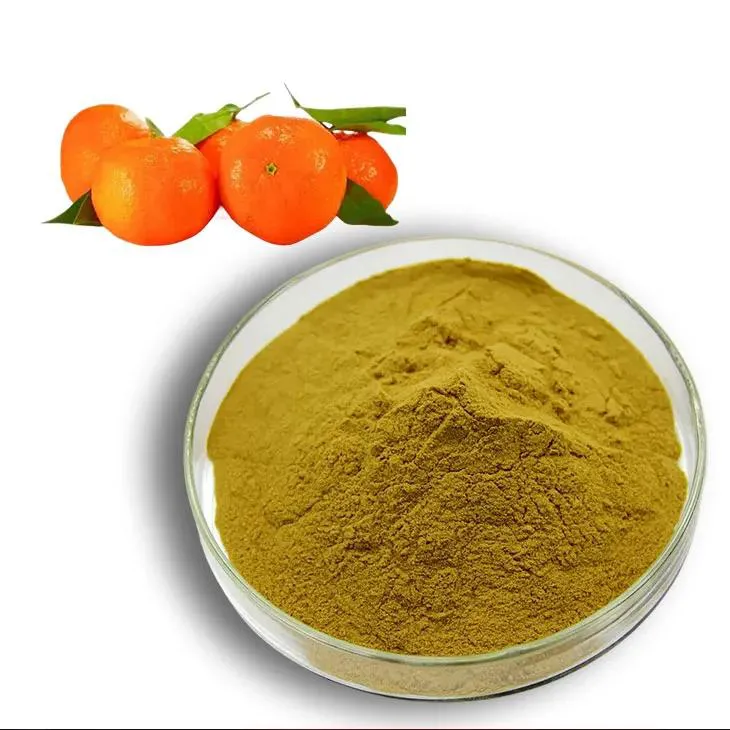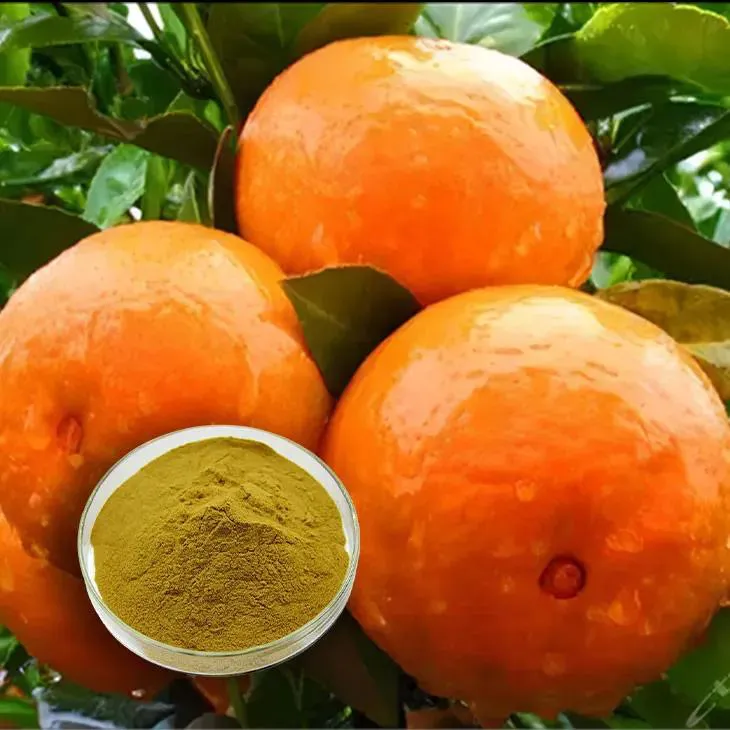- 0086-571-85302990
- sales@greenskybio.com
Application of Citrus Bioflavonoids in Skin Care.
2024-11-13

1. Introduction to Citrus bioflavonoids
Citrus bioflavonoids are a group of natural compounds that are predominantly found in citrus fruits such as oranges, lemons, grapefruits, and limes. These bioactive substances are abundant in various beneficial components that offer a wide range of potential health and skin - care benefits. The fact that they are derived from natural sources makes them an appealing option in the ever - expanding field of skin care.

2. Antioxidant Properties of Citrus bioflavonoids
2.1. Understanding Oxidative Stress on the Skin
Oxidative stress occurs when there is an imbalance between the production of free radicals and the body's ability to neutralize them. In the context of skin health, environmental factors such as ultraviolet (UV) radiation, pollution, and smoking can significantly increase the production of free radicals. These free radicals are highly reactive molecules that can damage skin cells, leading to premature aging, wrinkles, and a dull complexion.2.2. How Citrus Bioflavonoids Combat Oxidative Stress
Citrus bioflavonoids possess remarkable antioxidant capabilities. They work by donating electrons to free radicals, thereby neutralizing their reactivity. This process helps to prevent the free radicals from causing damage to the skin's cells, proteins, and lipids. For example, flavonoids like Hesperidin and naringin, which are commonly found in citrus fruits, have been shown to scavenge free radicals effectively. By reducing oxidative stress, citrus bioflavonoids play a crucial role in maintaining the skin's youthful appearance. They can help to slow down the development of wrinkles, fine lines, and age spots, giving the skin a more radiant and healthy look.
3. Improvement of Skin Barrier Function
3.1. The Importance of Skin Barrier Function
The skin barrier is a complex structure that serves as the body's first line of defense against external threats. It helps to prevent the entry of harmful substances such as bacteria, viruses, and allergens, while also reducing water loss from the skin. A healthy skin barrier is essential for maintaining skin hydration, elasticity, and overall health.3.2. Role of Citrus Bioflavonoids in Skin Barrier Enhancement
Citrus bioflavonoids have the potential to improve skin barrier function. They can stimulate the production of key components in the skin barrier, such as ceramides, lipids, and proteins. For instance, certain bioflavonoids can enhance the synthesis of filaggrin, a protein that plays a vital role in maintaining the integrity of the skin barrier. By strengthening the skin barrier, citrus bioflavonoids help to prevent moisture loss from the skin, keeping it hydrated and supple. This also reduces the risk of developing skin conditions such as dryness, eczema, and dermatitis.
4. Skin Brightening Effects
4.1. Causes of Dull Skin Complexion
There are several factors that can contribute to a dull skin complexion. These include excessive melanin production, which can be triggered by factors such as UV exposure, hormonal changes, and skin inflammation. Additionally, a build - up of dead skin cells on the surface of the skin can also make the skin appear dull and lackluster.4.2. Mechanisms of Citrus Bioflavonoids in Skin Brightening
Citrus bioflavonoids can contribute to skin brightening through multiple mechanisms. Some bioflavonoids have the ability to inhibit the activity of tyrosinase, an enzyme that is involved in the production of melanin. By reducing melanin production, they can help to lighten dark spots, hyperpigmentation, and even out skin tone. Moreover, citrus bioflavonoids can also promote cell turnover, which helps to remove dead skin cells from the surface of the skin, revealing a brighter and more glowing complexion.5. Incorporating Citrus Bioflavonoids into Skin Care Regimens
5.1. Citrus Bioflavonoid - Rich Skin Care Products
There are a growing number of skin care products on the market that contain citrus bioflavonoids. These include serums, moisturizers, face masks, and cleansers. For example, some high - quality serums are formulated with concentrated amounts of citrus bioflavonoids to target specific skin concerns such as aging or hyperpigmentation. When choosing a skin care product containing citrus bioflavonoids, it is important to look for products from reputable brands that use high - quality ingredients.5.2. Dosage and Application Considerations
The appropriate dosage of citrus bioflavonoids in skin care products may vary depending on the specific product and the intended use. In general, it is recommended to follow the instructions provided by the manufacturer. When applying products containing citrus bioflavonoids, it is advisable to start with a small amount and gradually increase if necessary. This can help to minimize the risk of any potential adverse reactions, such as skin irritation. It is also important to apply these products evenly on the skin and allow them to be fully absorbed.6. Safety and Potential Side Effects
6.1. General Safety Profile
Citrus bioflavonoids are generally considered safe for use in skin care products. Since they are natural compounds, they are less likely to cause severe adverse reactions compared to some synthetic ingredients. However, as with any skin care ingredient, there is still a small risk of individual hypersensitivity or allergic reactions.6.2. Identifying and Managing Potential Side Effects
Some people may experience mild skin irritation, redness, or itching when using products containing citrus bioflavonoids. If such symptoms occur, it is important to discontinue use immediately and consult a dermatologist. To reduce the risk of side effects, it is advisable to perform a patch test before using a new product containing citrus bioflavonoids. This involves applying a small amount of the product on a small area of the skin, such as the inner forearm, and observing for any signs of irritation over a 24 - hour period.7. Future Prospects of Citrus Bioflavonoids in Skin Care
7.1. Research and Development Trends
There is ongoing research into the potential of citrus bioflavonoids in skin care. Scientists are constantly exploring new ways to extract, purify, and formulate these compounds for maximum effectiveness. There is also a growing interest in combining citrus bioflavonoids with other beneficial skin care ingredients to create synergistic effects. For example, combining citrus bioflavonoids with hyaluronic acid or vitamin C could potentially enhance their skin - care benefits.7.2. Potential New Applications
In addition to their current applications in antioxidant protection, skin barrier improvement, and skin brightening, citrus bioflavonoids may have potential new applications in the future. For instance, they could be explored for their role in wound healing, anti - inflammatory effects on the skin, or in the treatment of specific skin diseases. The versatility of citrus bioflavonoids makes them an exciting area of research in the field of skin care.8. Conclusion
Citrus bioflavonoids offer a wide range of potential benefits for skin care. Their antioxidant properties, ability to improve skin barrier function, and skin - brightening effects make them a valuable ingredient in formulating effective skin care regimens. While they are generally safe, it is important to be aware of potential side effects and to use products containing them appropriately. With ongoing research, the future prospects of citrus bioflavonoids in skin care look promising, and we can expect to see more innovative applications and products in the coming years.
FAQ:
What are citrus bioflavonoids?
Citrus bioflavonoids are bioactive components originating from citrus fruits. They possess a variety of beneficial properties for the skin.
How do citrus bioflavonoids protect the skin?
Citrus bioflavonoids protect the skin through their remarkable antioxidant capabilities. They can safeguard the skin from environmental damage and oxidative stress, thus helping to maintain a youthful appearance.
Can citrus bioflavonoids improve skin barrier function?
Yes, citrus bioflavonoids have the potential to improve skin barrier function. By doing so, they can prevent moisture loss from the skin.
Do citrus bioflavonoids contribute to skin brightening?
Yes, citrus bioflavonoids contribute to skin brightening among their diverse functions in skin care.
Why are citrus bioflavonoids a versatile option in skin care?
Citrus bioflavonoids are a versatile option in skin care because they have multiple functions such as antioxidant protection, improving skin barrier function, preventing moisture loss, and skin brightening.
Related literature
- The Role of Citrus Bioflavonoids in Cosmetic Dermatology"
- "Citrus Bioflavonoids: A Promising Ingredient for Skin Health"
- "Beneficial Effects of Citrus Bioflavonoids on Skin Barrier Function"
- ▶ Hesperidin
- ▶ citrus bioflavonoids
- ▶ plant extract
- ▶ lycopene
- ▶ Diosmin
- ▶ Grape seed extract
- ▶ Sea buckthorn Juice Powder
- ▶ Beetroot powder
- ▶ Hops Extract
- ▶ Artichoke Extract
- ▶ Reishi mushroom extract
- ▶ Astaxanthin
- ▶ Green Tea Extract
- ▶ Curcumin Extract
- ▶ Horse Chestnut Extract
- ▶ Other Problems
- ▶ Boswellia Serrata Extract
- ▶ Resveratrol Extract
- ▶ Marigold Extract
- ▶ Grape Leaf Extract
- ▶ blog3
- ▶ blog4
- ▶ blog5
-
Organic Tongkat Ali extract powder factory.
2024-11-13
-
How to make powder with ashwagandha extract.
2024-11-13
-
Rosehip extract manufacturers from China.
2024-11-13
-
The best cat's claw extract in nature.
2024-11-13
-
Chinese Dandelion Leaf Extract Suppliers.
2024-11-13
-
Artichoke Leaf Extract
2024-11-13
-
Black Garlic Extract
2024-11-13
-
Chia Seed Powder
2024-11-13
-
Berberis aristata Extract
2024-11-13
-
Cranberry Extract
2024-11-13
-
Coix Seed Extract
2024-11-13
-
Andrographis Paniculata Extract Powder
2024-11-13
-
Garcinia Cambogia Extract
2024-11-13
-
Natural grape seed extract
2024-11-13
-
Boswellia Serrata Extract
2024-11-13





















